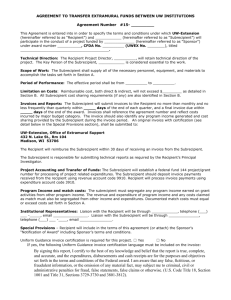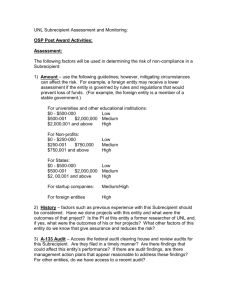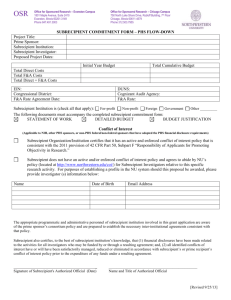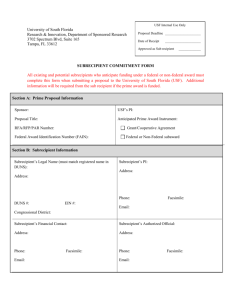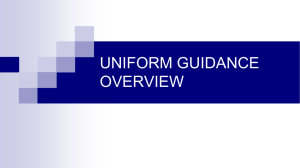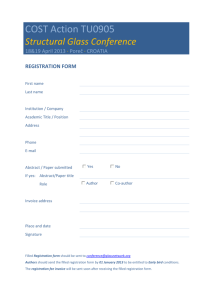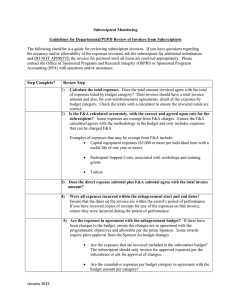To provide reasonable assurance that subrecipient awards are being administered... with laws, regulations, and the provisions of contracts or grant... Guidelines for Subrecipient/Subcontractor Agreements
advertisement
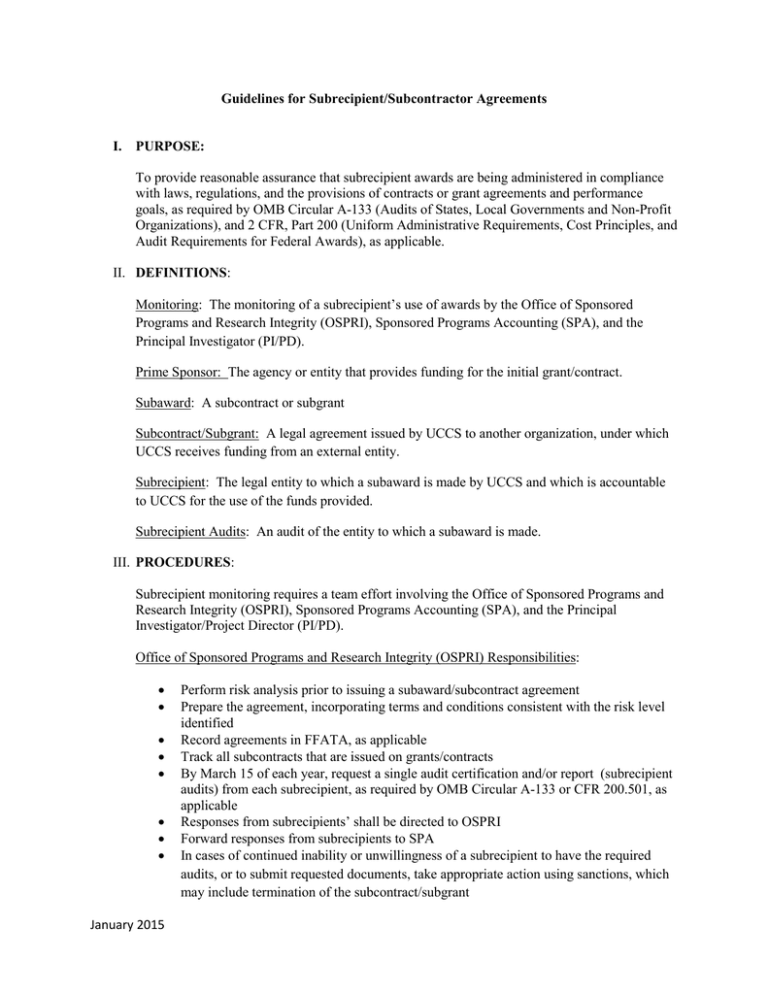
Guidelines for Subrecipient/Subcontractor Agreements I. PURPOSE: To provide reasonable assurance that subrecipient awards are being administered in compliance with laws, regulations, and the provisions of contracts or grant agreements and performance goals, as required by OMB Circular A-133 (Audits of States, Local Governments and Non-Profit Organizations), and 2 CFR, Part 200 (Uniform Administrative Requirements, Cost Principles, and Audit Requirements for Federal Awards), as applicable. II. DEFINITIONS: Monitoring: The monitoring of a subrecipient’s use of awards by the Office of Sponsored Programs and Research Integrity (OSPRI), Sponsored Programs Accounting (SPA), and the Principal Investigator (PI/PD). Prime Sponsor: The agency or entity that provides funding for the initial grant/contract. Subaward: A subcontract or subgrant Subcontract/Subgrant: A legal agreement issued by UCCS to another organization, under which UCCS receives funding from an external entity. Subrecipient: The legal entity to which a subaward is made by UCCS and which is accountable to UCCS for the use of the funds provided. Subrecipient Audits: An audit of the entity to which a subaward is made. III. PROCEDURES: Subrecipient monitoring requires a team effort involving the Office of Sponsored Programs and Research Integrity (OSPRI), Sponsored Programs Accounting (SPA), and the Principal Investigator/Project Director (PI/PD). Office of Sponsored Programs and Research Integrity (OSPRI) Responsibilities: January 2015 Perform risk analysis prior to issuing a subaward/subcontract agreement Prepare the agreement, incorporating terms and conditions consistent with the risk level identified Record agreements in FFATA, as applicable Track all subcontracts that are issued on grants/contracts By March 15 of each year, request a single audit certification and/or report (subrecipient audits) from each subrecipient, as required by OMB Circular A-133 or CFR 200.501, as applicable Responses from subrecipients’ shall be directed to OSPRI Forward responses from subrecipients to SPA In cases of continued inability or unwillingness of a subrecipient to have the required audits, or to submit requested documents, take appropriate action using sanctions, which may include termination of the subcontract/subgrant Sponsored Programs Accounting (SPA) Responsibilities: Review certifications/reports for audit findings If audit findings, follow-up with the subrecipients response and resolution Issue a management decision on audit findings, if any, within six months after receipt of the subrecipient’s audit report and ensure that the subrecipient takes appropriate and timely corrective action Consider whether audits of subrecipients necessitate adjustment of UCCS’s records and/or continued contractual activities Compile a summary report by the end of December of each year, with a copy to OSPRI. Principal Investigator/Project Director (PI/PD) Responsibilities: January 2015 Securing the completed subrecipient commitment form from the proposed subrecipient prior to proposal submission Upon award, completing the Request for Subrecipient/Subcontract Agreement and forwards to OSPRI During the award, UCCS PI’s/PD’s are to monitor the subrecipient’s use of awards to provide reasonable assurance that the subrecipient administers awards in compliance with laws, regulations, and the provisions of contracts or grant agreements and performance goals. Monitoring will be conducted through the use of o Reporting – review of performance reports submitted to the PI/PD by the subrecipient o Invoices - Attachment A may be used to assist in ensuring accurate and consistent review of invoices from the subrecipient; Effective February 1st, 2015, Attachment B must accompany all invoices for payment. It is suggested that Attachment B serve as page one of the invoice when submitting it to apinvoice@cu.edu. Additional monitoring may be done through the use of: o Contact – regular contacts with subrecipients and inquiries concerning award activities o Site Visits – if necessary, visiting subrecipient to review financial and program records along with observing operations Attachment A Subrecipient Monitoring Guidelines for Departmental/PI/PD Review of Invoices from Subrecipients The following checklist is a guide for reviewing subrecipient invoices. If you have questions regarding the accuracy and/or allowability of the expenses invoiced, ask the subrecipient for additional information and DO NOT APPROVE the invoice for payment until all items are resolved appropriately. Please contact the Office of Sponsored Programs and Research Integrity (OSPRI) or Sponsored Programs Accounting (SPA) with questions and/or assistance. Step Complete? Review Step 1) Calculate the total expenses. Does the total amount invoiced agree with the total of expenses listed by budget category? Their invoice should have a total invoice amount and also, for cost-reimbursement agreements, detail of the expenses by budget category. Check the totals with a calculator to ensure the invoiced totals are correct. 2. 2) Is the F&A calculated accurately, with the correct and agreed upon rate for the subrecipient? Some expenses are exempt from F&A charges. Ensure the F&A calculated agrees with the methodology in the budget and only includes expenses that can be charged F&A. Examples of expenses that may be exempt from F&A include: Capital equipment expenses ($5,000 or more per individual item with a useful life of one year or more) Participant Support Costs, associated with workshops and training grants Tuition 3) Does the direct expense subtotal plus F&A subtotal agree with the total invoice amount? 4) Were all expenses incurred within the subagreement start and end dates? Ensure that the dates on the invoice are within the award’s period of performance. If you have received copies of receipts for any of the expenses on that invoice, ensure they were incurred during the period of performance. 5) Are the expenses in agreement with the subagreement budget? If there have been changes to the budget, ensure the changes are in agreement with the programmatic objectives and allowable per the prime Sponsor. Some awards require prior approval from the Sponsor for budget changes January 2015 Are the expenses that are invoiced included in the subcontract budget? The subrecipient should only invoice for approved expenses per the subcontract or ask for approval of changes. Are the cumulative expenses per budget category in agreement with the budget amount per category? Does the total spent per budget category agree with the subcontract budget categories? Has the subrecipient overspent in one budget category and underspent in another budget category? For example, are they charging less in salaries but more laboratory expenses? 6) Are the expenses in agreement with the programmatic plan or work completed to date? (The programmatic plan will be described in the proposal SOW, along with the planned timetable. Any agreed-upon changes to the plan would be in writing and would be filed with the subrecipient agreement and other paperwork). Expenses invoiced should agree with the work incurred if the agreement is a cost reimbursable contract. Were there programmatic changes that would cause changes to the types of expenses? For example, if the programmatic changes resulted in eliminating the need for study subject payments, subcontractors to the subrecipient, or consulting, the invoices should not contain these types of expenses. Is the subrecipient invoicing for salaries during a time when it is known that no work should be occurring due to the programmatic plan? For example, the subagreement involves holding summer camps with all effort occurring during May through September. The subrecipient should not invoice salary costs that were incurred during January. 7) Are the expenses allowable per the subagreement and the prime award? Remember the prime award requirements and budget restrictions flow down to the subrecipient. If there are specific disallowances listed in the prime award, these will also apply to the subrecipient. The following are examples of sensitive expenditures. If these types of expenses are invoiced, ensure that the subcontract explicitly approved these expenses as allowable per the prime award: January 2015 Food/Official functions Honorarium Study subject payments – ensure appropriate IRB approvals occurred. Local telephone service Postage Office supplies Membership Dues Administrative salaries If the prime agreement will not pay for tuition remission or general fringe benefits, the subrecipient should not invoice for such expenses If the prime does not allow travel expenses, the subrecipient should not invoice for travel related expenses. 8) For a cost reimbursable subagreement, are expenses that are charged based on actual expenses, or does it appear to be an allocation of the budget? For example, are the invoices consistently the same amount each month or always round dollar amounts? Cost reimbursable subagreements require invoicing based on actual expenses only. If you suspect an allocation is occurring, you can ask for receipts or other documentation to substantiate their charges. 9) Does the invoice contain the following statement and is it signed by the subrecipient? (These are requirements of 2 CFR Part 200) “By signing this report, I certify to the best of my knowledge and belief that the report is true, complete, and accurate, and the expenditures, disbursements and cash receipts are for the purposes and objectives set forth in the terms and conditions of the Federal award. I am aware that any false, fictitious, or fraudulent information, or the omission of any material fact, may subject me to criminal, civil, or administrative penalties for fraud, false statements, false claims or otherwise. (U.S. Code Title 18, Section 1001 and Title 31, Sections 3729-3730 and 3801-3812). 10) If the subagreement includes cost sharing requirements, does the invoice contain the required cost sharing information? Cost sharing expenses must follow the same rules as the expenses paid by the prime award. Ensure the cost sharing expenses comply with the agreement, including amounts and types of expenses. January 2015 11) Has the PI/PD signed the Subrecipient/Subcontractor Invoice Approval? If the departmental administrator is responsible for reviewing invoices for accuracy and ensuring payment is processed, make sure the PI/PD approves. Some items above (such as #6) may only be evaluated by the PI/PD or other person directly involved in the overall technical conduct of work. The PI/PD is ultimately responsible for expenditures. 12) Once the invoice has been reviewed and approved by the PI/Research Administrator, email the invoice, attaching the subrecipient/subcontractor invoice approval form signed by the PI to apinvoice@cu.edu, making sure the PO number is referenced on the invoice. Receiving is required when the PO total is over $5,000, regardless of the amount of each invoice. Standing Purchase Order (SPO) invoices require approval – no matter the amount of the invoice – in order to pay. An email notification from CU Marketplace will be sent to the Requestor and the appropriate Approver(s) when an SPO invoice is entered and pending approval. REMEMBER: IF THERE ARE ANY QUESTIONS ON THE INVOICES, DO NOT APPROVE UNTIL ALL ITEMS ARE APPROPRIATELY RESOLVED January 2015 ATTACHMENT B Subrecipient/Subcontractor (Subrecipient) Invoice Approval Subrecipient Name: UCCS Principal Investigator/Project Director Name: Date Invoice Received: Invoice Period: Final Invoice? UCCS Reference No.: UCCS PO No. Invoice Number: Amount Due: $ - If “Yes” is it marked “FINAL”? Yes Yes No Amount Remaining on Subaward: $ No I certify payment of this invoice (initial each statement below): _____ is appropriate for work conducted during the stated invoice period, _____ is for allowable costs incurred for the purpose of this award, and _____ all required reports and/or deliverables required to date have been received and are satisfactory. ____________________________________________ UCCS Principal Investigator/Project Director Date January 2015
